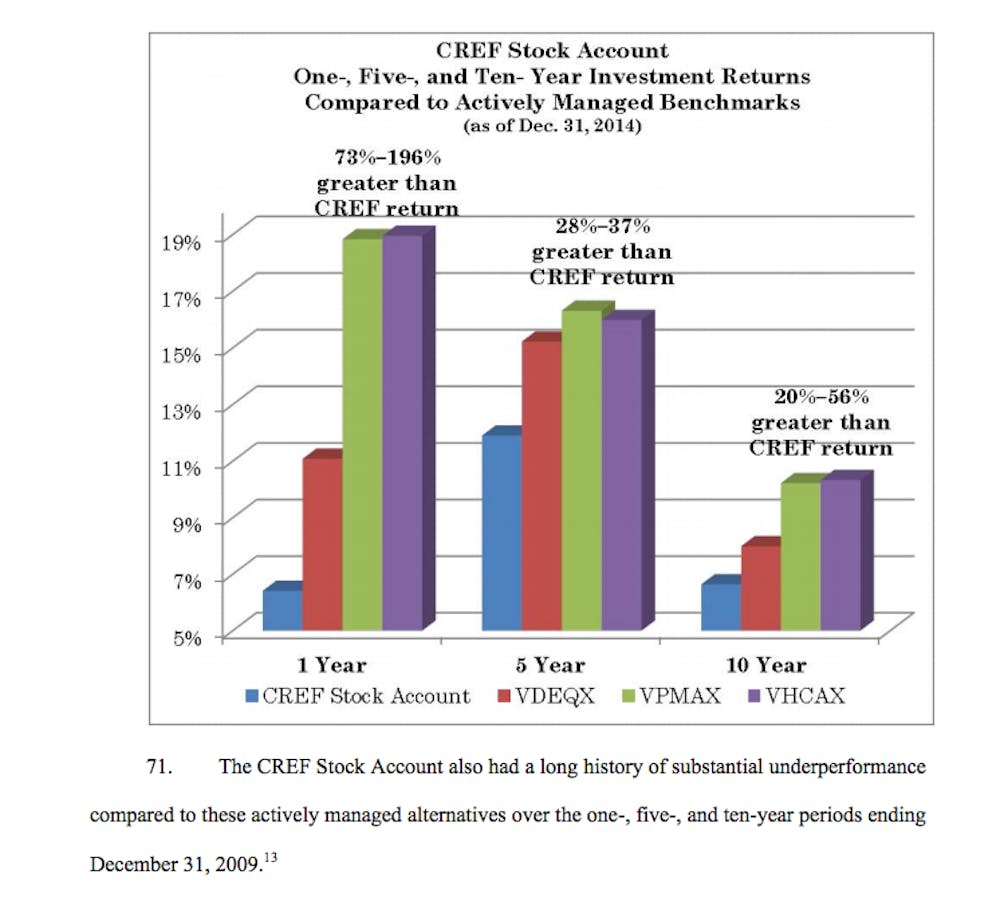The University has joined a list of elite institutions under legal fire for the management of retirement plans for employees. Four former and current University employees, represented by the Law Offices of Sonja L. Deyoe, Schneider Wallace Cottrell Konecky Wotkyns LLP and Berger & Montague P.C., filed a class action complaint July 6 on behalf of the more than 12,000 University employees that are participants and beneficiaries of the Deferred Vesting Retirement Plan or of the Legacy Retirement Plan. The complaint alleged that the University breached its fiduciary duties to its employees under the Employment Retirement Income Security Act by choosing plans that require excessively high administrative fees and an unreasonable array of fund choices not vetted to ensure high performance.
Universities across the country are facing similar cases, including Yale, Northwestern University and Columbia. Most suits are awaiting responses from the universities. Complaints filed earlier this year, such as one at Duke University, have heard motions to dismiss. In May, a federal court judge denied Duke’s motion to dismiss in the case.
The University has not yet issued a legal response.
“At Brown, we are deeply committed to the well-being of our employees and approach our fiduciary responsibilities in sponsoring retirement plans with the utmost attentiveness,” said Brian Clark, director of news and editorial development. “We have a strong case to make and will respond as appropriate through the legal process,” he said.
The case against the University exists in reference to two 403(b) plans that allow employees of the University to pool their money and invest in funds for the purpose of collecting earnings and safeguarding them for retirement. The University’s two plans together have more than $1.2 billion in assets. Fidelity Investments and TIAA-CREF serve as the University’s outside investment managers.
The plaintiffs allege that the University should have used the size of its assets to negotiate lower fees for fund management and administrative services. Instead, the University hired multiple recordkeepers, which were each compensated based on a revenue sharing system, the complaint stated. The complaint cited a 2013 survey of 403(b) plans which stated that 90 percent of plans use a single recordkeeper. As a result of this alleged negligence, managers of the funds receive a percentage of the asset as a fee in exchange for services that other retirement plans offer at a fixed cost, the complaint asserted.
It also alleges that the plans include too many investment options. As of Dec. 31, 2014, employees through the Deferred Vesting Retirement Plan could choose from 177 investment options through Fidelity Investments and 26 through TIAA-CREF, some of which were duplicative. Plaintiffs allege that this array of investment options is “bewildering,” according to the complaint.
According to a study cited in the complaint, “Higher Education’s Response to a New Defined Contribution Environment,” plans with too many choices confuse investors, and those with too many recordkeepers are inefficient.
“Such designs typically are expensive and fail to leverage plan size. They can also be confusing to the average plan participant, who is likely to fall short of achieving retirement readiness and would benefit from more guidance,” the study stated.
Additionally, the University did not adequately vet the funds to ensure high performance, the plaintiffs allege. The CREF Stock Account, which is available to University employees, has been performing poorly compared to other similarly risky investment choices, such as the Vanguard Total Stock Market Index Fund and the Vanguard Institutional Index, the complaint stated.
“For each comparison, the CREF Stock Account dramatically underperformed the benchmark and index alternatives,” the complaint stated.
The complaint also alleges that the CREF Stock Account has underperformed actively managed alternatives.





